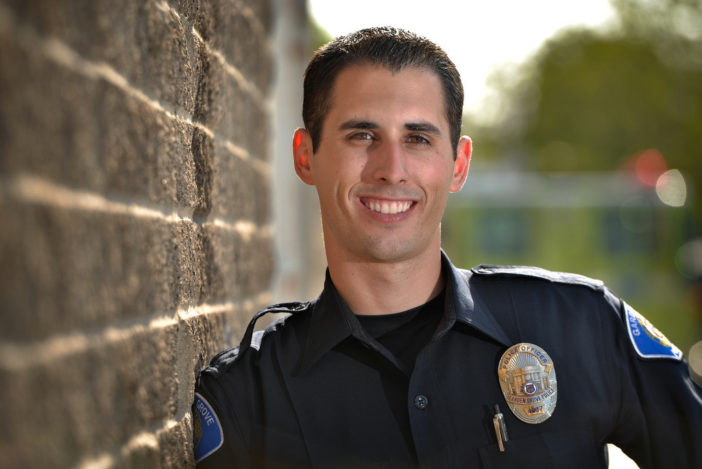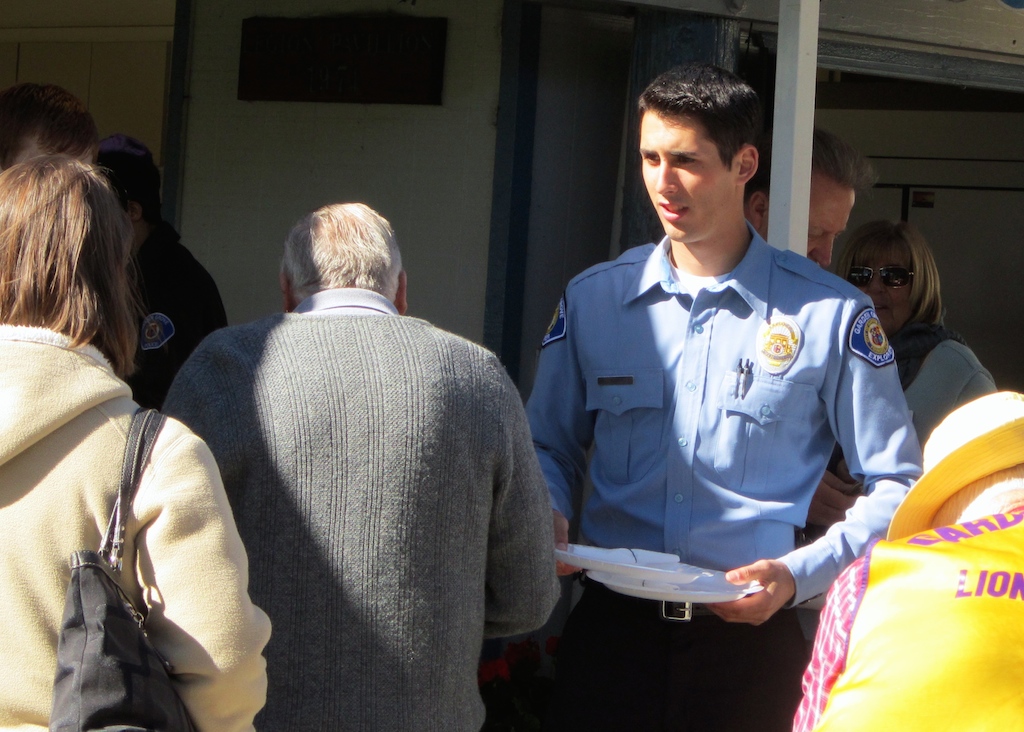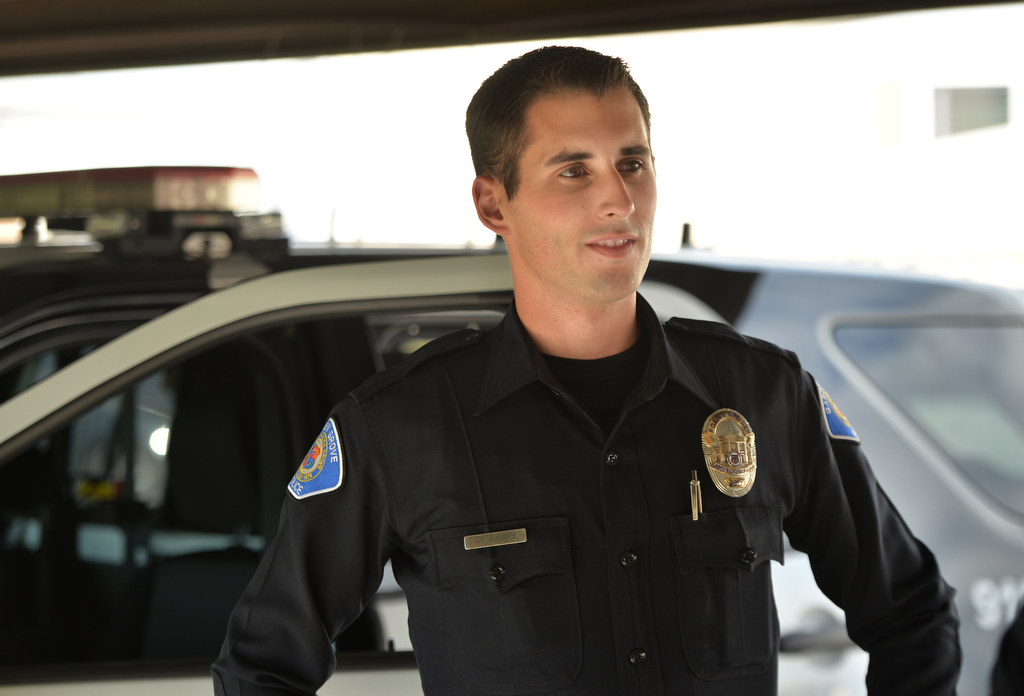In early May, while speaking to explorers at an awards gala, Garden Grove Police Chief Todd Elgin compared Major League Baseball’s farm system to his agency’s ideal method of hiring new officers:
Identify talented prospects when they’re young, groom them for success through the explorer and cadet programs, put them through the police academy, and then bring them aboard.
Among the hundred-plus people listening in the room was a rookie cop who could pass for younger than his 22 years.
The emcee of the ceremony, Officer Jason Perkins, gave that officer, Austin Laverty, a shout out.
“We are very proud of Austin’s accomplishments, having come through the explorer program, through the cadet program, and on to his police officer position,” said Perkins, who was Laverty’s explorer advisor.
When Laverty was hired as a cadet, he worked in the Traffic Unit where Perkins was a motor officer and a crash investigator.
When Laverty became a Garden Grove police officer after graduating from the Orange County Sheriff’s Regional Training Academy last August, Perkins was his first field training officer.
“He still can’t get away from me because he now works on my shift as a solo patrol officer,” Perkins told the crowd.
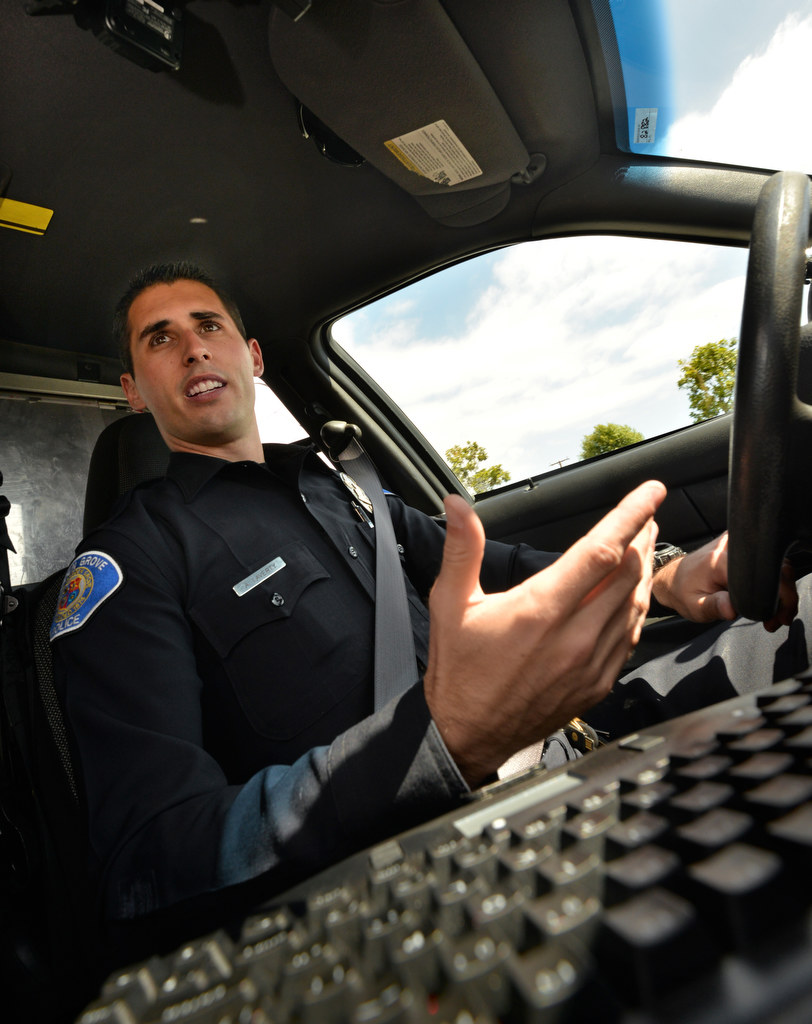
Garden Grove PD Officer Austin Laverty talks about what it’s like being a new police officer while on patrol recently.
Photo by Steven Georges/Behind the Badge OC
During a recent ridealong, Laverty — he just turned 23 — talked about how his experience as an explorer and a cadet was vital to him getting hired.
“If it wasn’t for those experiences,” he said, “I wouldn’t be here.”
The agency has had other Garden Grove PD explorers-turned-GGPD officers. Laverty’s the most recent example of how the “farm system” approach to hiring new officers can work — and proof of how diligence and hard work can pay off.
Laverty, who grew up on the west side of Garden Grove, joined the GGPD explorers right after he graduated from Pacifica High School. He was working part time fabricating custom wheels for cars, but he devoted every weekend to explorer duties, such as working DUI checkpoints.
“I went to the regular explorers meeting every week and I don’t think I ever missed an explorer event on the weekend,” says Laverty, who always had his eye on a career in law enforcement. He was inspired by his grandfather, retired LAPD Officer Roger Langner, who spent 20 years at the agency and retired in 1984 as a narcotics detective.
“He retired before I was born,” Laverty says, “but I grew up hearing his stories. I was always interested in (a career in law enforcement).”
After nine months as an explorer, Perkins recommended that Laverty apply to become a cadet, which is a paid ($12 per hour), part-time position. He made it on the first try after he had just turned 20, and was a cadet for just under two years.
Laverty praised Perkins as a role model.
“I admire his dedication and leadership,” he says.
Like any rookie cop, Laverty is on probation for 18 months. He says he’s still learning the ropes but already he has seen a lot of action, including pulling over a driver without his headlights on who then engaged Laverty in a high-speed chase that ended with the suspect hitting a Santa Ana PD patrol car. The car had been stolen.
“That was a rush,” Laverty said. “It was a lot of fun, but also scary. It was like being on a roller coaster.”
Laverty is saving money to buy a house.
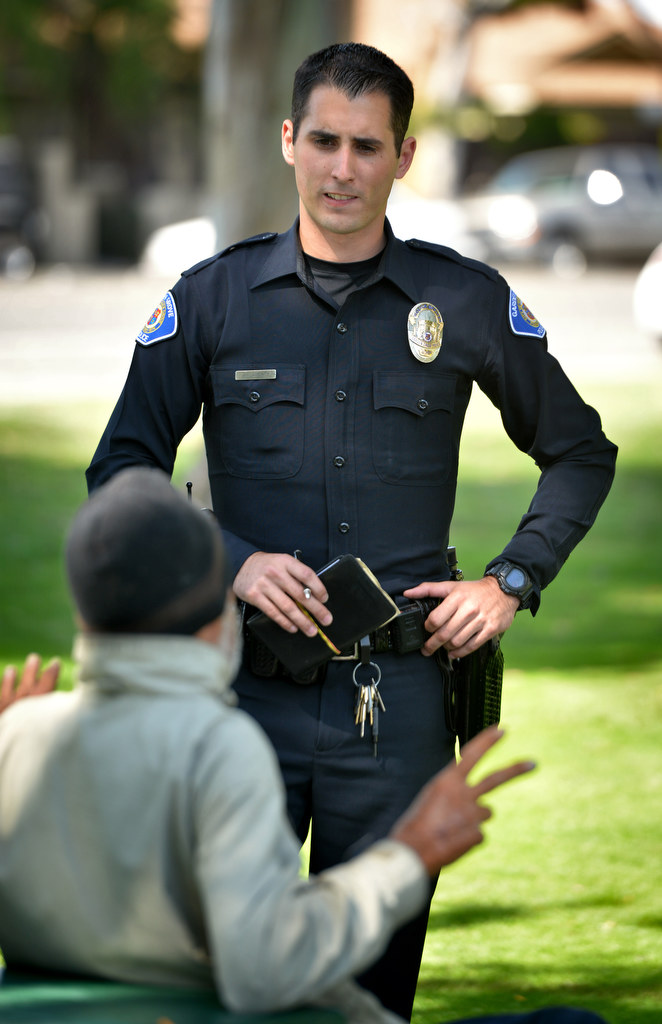
Austin Laverty of the Garden Grove PD talks to a homeless man at Pioneer Park in Garden Grove while on patrol.
Photo by Steven Georges/Behind the Badge OC
“Every day is a challenge, but it’s doable,” he says of his young career as an officer. “It’s something I know I can do. My goal is to be able to do the job and not violate anyone’s rights and go home safe.
“The pendulum has swung, and right now the public doesn’t seem to be much in favor of police officers. It’s a tough climate. But I get to do stuff most people are never given the opportunity to do, such as bring a lost kid to his parents, or put a bad guy in jail, or help someone out.
“This is a unique opportunity for me, and I love it. I can’t believe they pay me to do this.”
Perkins says Laverty has what is takes to become a successful officer.
“Austin is a great example of a recruitment tool that can produce quality law enforcement professionals,” Perkins said. “Teenagers can enter a police agency as volunteers and be mentored by experienced professionals who guide them into their own careers as they transition to adulthood, just like Austin did.”
Not every cadet or explorer volunteer goes into law enforcement and that’s OK, Perkins says.
“As long as they take their experience, their values, and their discipline into the world and become ethical contributors to society, we’ll chalk that up as a success,” Perkins says. “Of course, we take our greatest pride in those who transition into law enforcement-related careers. This whole process really starts long before these young volunteers come through our doors — it really starts at home with good parenting.
“Parents aren’t perfect. Their children aren’t perfect. We aren’t perfect. We’re not looking for perfection — we’re looking for those who have a solid moral foundation, a strong work ethic, and an understanding of the complex community that calls upon its police force for service.”
Laverty has the following advice for teens considering following in his footsteps:
“Look into it before doing it. Take ridealongs, take law enforcement classes in college. Just sitting at home watching cop shows won’t cut it. And it’s a challenging time. You have to know what’s going on in the world and how the pendulum has swung.”
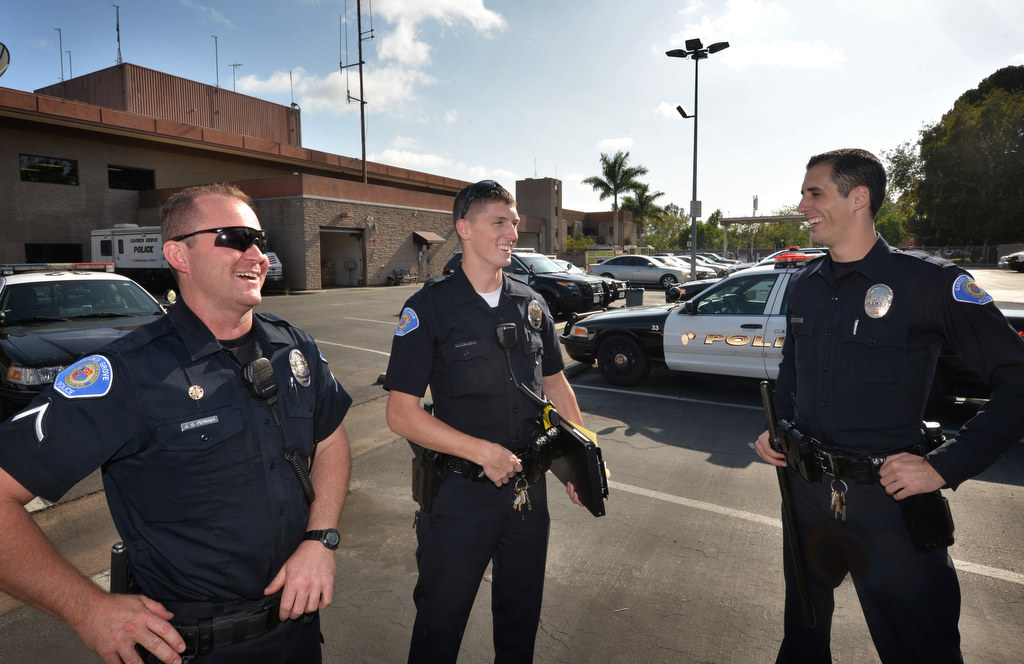
Garden Grove PD Officer Austin Laverty, right, talks about the day’s experiences with Officer Jason Perkins, left, and John Yergler, another new officer, as they arrive back at the station.
Photo by Steven Georges/Behind the Badge OC
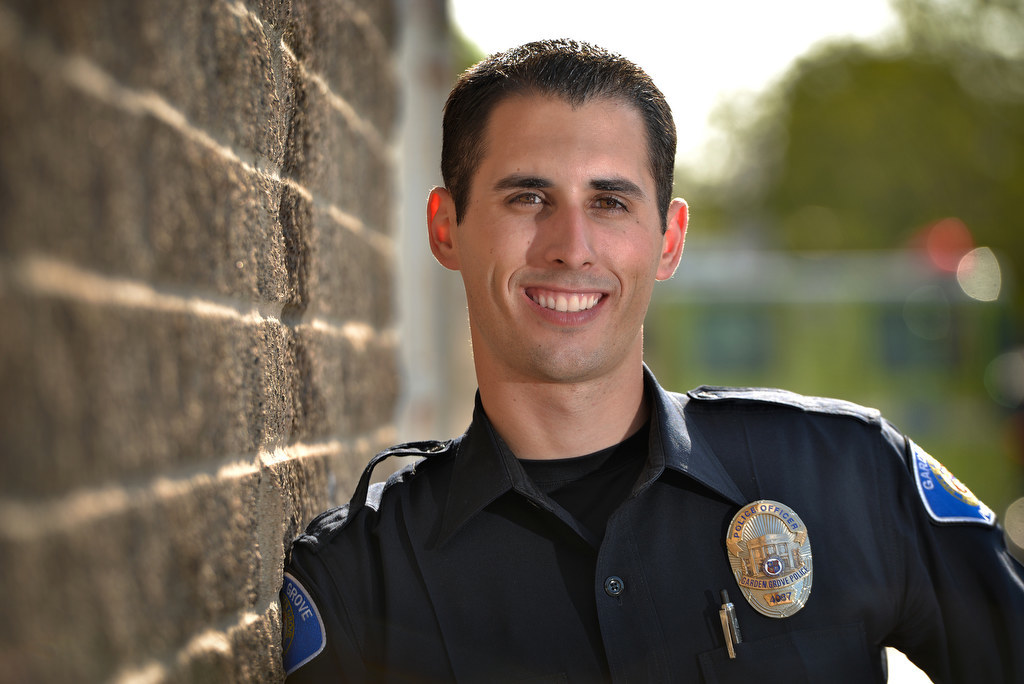
Austin Laverty, a new officer with the Garden Grove PD, started as an explorer and cadet with the agency. Photo by Steven Georges/Behind the Badge OC
 Behind the Badge
Behind the Badge
